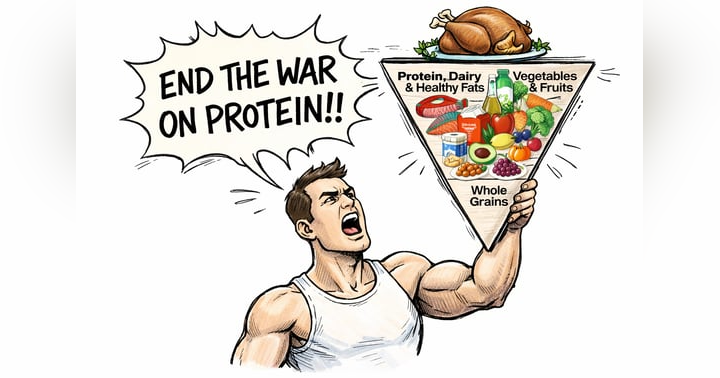What foods will help me sleep better?
Have you ever been left scrambling for answers when your patients ask about the mysterious link between sleep and nutrition? You're not alone!
We often find ourselves navigating uncharted territory when it comes to dietary advice for sleep.
Feeling nervous, you just say "try some melatonin" or "stop drinking coffee after 12PM." 😬
But, I think you can offer better nutrition advice, without adding time to the visit.
In today’s article, we’re taking a look at Foods That Promote Better Sleep!
Let’s get into it…
I always start by advising my patient to stick to the basics.
Never skip breakfast.
Incorporate more plant-based foods into their day.
Diversify their protein sources.
Stay well-hydrated by drinking plenty of water.
These timeless guidelines have demonstrated their efficacy in promoting health and longevity. It's crucial to avoid falling into the trap of every new diet fad.
If a particular eating pattern isn't sustainable for their daily life, it's not worth adopting.
Their dietary choices should align with their preferences, lifestyle, goals, and schedule.
Next, intentional movement every day is essential.
Regular exercise not only boosts energy levels by enhancing circulation, oxygen delivery, and endorphin release but also aids in weight management, reduces the risk of chronic diseases, and enhances overall physical fitness and stamina.
Research supports both moderate to vigorous exercise and reducing sedentary behavior, especially relevant for those of us who spend significant time sitting in office settings. A meta-analysis of observational studies in adults concluded that for each 1-hour increment in sitting time (>7 hours/day) all-cause mortality risk increased by 5%, even after adjusting for moderate to vigorous physical activity.
Incorporating small changes like walking after meals, standing while working, using stairs instead of elevators, and taking brief walks during breaks can significantly reduce sedentary time and improve health outcomes.
--------------------------------------------------------------------------
Imagine if you felt confident answering your patient's nutrition questions?
And you could provide advice that actually improved their health outcomes?
Right now you're reading a small part of the Nutrition Wrap-Up newsletter.
I release a NEW issue like this each Sunday.
Join 1,000+ smart clinicians who read the Nutrition Wrap-Up weekly.
Subscribe today to get the latest issue (plus a few helpful freebies)
---------------------------------------------------------------------
While there isn’t a single food that is going to be a magic bullet to getting your patient to sleep better, focusing on certain nutrients may actually help their body experience an easier time falling asleep or getting better-quality rest. Here's some additional advice:
1. Fuel Up Throughout the Day. Don't skip meals! Make sure that you're consuming enough food throughout the day to ensure stable energy levels and prevent disruptive late-night hunger pangs.
2. Eat more CARBS! Sweet potatoes, brown rice, and oatmeal are superstars when it comes to complex carbohydrates. These break down slowly, keeping you feeling satisfied and promoting the release of serotonin, a brain chemical that helps you relax and fall asleep.
3. Magnesium Magic. Foods like avocado, pumpkin seeds, almonds, and cashews are packed with magnesium. This mineral helps regulate melatonin production, your body's natural sleep hormone, and eases you into a calmer state. Pistachios are a double whammy – they're high in magnesium and melatonin, perfect for relaxing muscles and keeping blood sugar stable. Soymilk is also rich in magnesium and is an excellent source of vitamin A and calcium, two nutrients that play a large role in the hormonal pathways necessary to sleep.
4. Bedtime Beverages. Chamomile, lavender, and ginger teas are classic bedtime soothers. Warm bone broth, milk or soy milk and tart cherry juice contain natural melatonin and other sleep-friendly compounds. Feeling fancy? Golden milk, a warm turmeric latte, is another delicious and soothing nighttime drink.
5, Late-Night Munchies. While late-night eating myths persist, it's essential to prioritize adequate nutrition throughout the day. Under-eating can stress the body and disrupt sleep patterns. Aim for earlier meals, whenever possible, or opt for mini-meals or snacks to sustain energy levels. However, there is no magic number for when it is too late to eat something. Our bodies don't adhere to strict eating schedules, and hunger doesn't adhere to the clock. If you work late or overnight, you definitely should not stop eating after 8PM just because.
Remember, a balanced diet is key. Listen to your body's hunger cues throughout the day and wind down with these soothing options. Sweet dreams!
Did you enjoy this quick read?
The best clinicians incorporate solid nutrition tips into their patient education.
But finding the right words, with limited time is challenging.
I'll teach you how to do it.
Sign up for my Nutrition Wrap-Up newsletter to learn exactly how to discuss nutrition with your patients. As a subscriber, you'll also get actionable nutrition freebies along the way.
Subscribe to the Nutrition Wrap-Up today!





